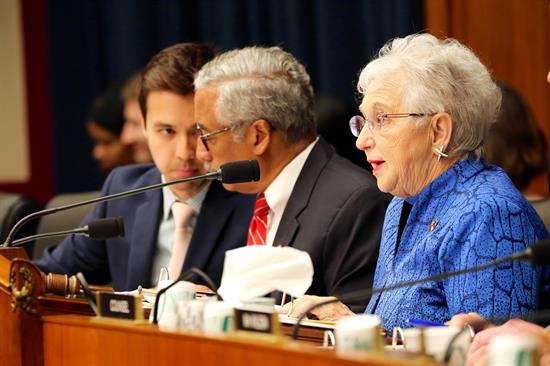Just a few days ago, we experienced yet another tragedy, this time at Santa Fe High School in Texas. Madam Secretary, I hope we’ll hear from you today about the work of the Commission on School Safety. I know state and local school districts are struggling with how to address this issue, and I know parents and students are concerned and even scared. I hope today will be an opportunity for all of us to learn more about how the Commission is developing recommendations for keeping our schools safe
As members are aware, this hearing was originally scheduled for December of last year, but had to be postponed due to changes in the House schedule. I want to thank Secretary DeVos for her flexibility and for working with the committee to make today’s hearing possible.
Given that Secretary DeVos’s primary responsibility is to faithfully carry out the laws enacted by Congress, having this dialogue about the Department’s priorities and activities is critical.
While the Constitution is clear about our roles, it’s less clear about what we must do in terms of policy. As I have reminded members of this committee on more than one occasion, there are 4,543 words in the Constitution. Not one of them is the word “education,” or a synonym for it.
Our country was founded on the principles of life, liberty, and the pursuit of happiness. It has been my experience that education, in whatever form it may take, is the key to all of those pursuits. I believe on that point, we can all agree.
I also believe most of the members of this committee would agree that our constituents have strong feelings about the role of the federal government in education policy. They often tell us: the less from Washington, the better. Local control isn’t just a matter of philosophy, it’s a matter of practicality.
We’ve seen that firsthand through the work we have done on workforce development. Two examples that come to mind are the Workforce Innovation and Opportunity Act and the Strengthening Career and Technical Education for the 21st Century Act. These pieces of legislation reflect the simple fact that local control and input make all the difference in ensuring that educational pursuits yield real results for Americans who just want to live successful lives.
This committee took a similar approach to K-12 education with the Every Students Succeeds Act. We firmly believe that states and school districts have an obligation to provide all students an excellent education and hold schools accountable for the performance of all students. But effective accountability must have buy-in from parents, teachers, and other state and local leaders. I applaud states and school districts for stepping up to this challenge under ESSA and the Department for enforcing the law as written.
Secretary DeVos has made it clear that she is also a believer in local solutions for education challenges. It’s parents and the local school leaders they know and trust who are best equipped to make the decisions that will help improve education for all students. Most of the time, it should be our job at the federal level to stay out of their way. Sometimes there’s a need for legislation. Other times, it’s up to the Department to take a step back and let state and local officials respond to the needs of their communities.
For example, under the Bush administration, the Department issued seven economically significant rules. Rules carry this designation when they would have an annual impact on the economy of $100 million or more or would have any material adverse effect on "the economy, productivity, competition, jobs, the environment, public health or safety, or State, local or tribal governments or communities." President Obama’s administration issued as many such rules in a single year, and 27 in the Department alone over the length of the administration. That was a nearly 300 percent increase in the regulatory burden on education alone.
That’s why it’s crucial that we, the committee of jurisdiction, have a strong and productive relationship with the Secretary of Education. I expect today’s hearing to be an important chapter in that relationship.
Madam Secretary, it’s been a pleasure getting to know you over the course of your time at the Department. I know what drives you to show up to work every day is the same thing that drives each one of us – ensuring all students have access to an excellent education. I applaud your willingness to take on this work in the face of the unprecedented vitriol you face. We look forward to hearing about what you’ve done so far to restore the Department’s authority to its rightful place, and the creative ways you’ve found to help open doors for Americans looking for more opportunities in education.
Again, it’s a pleasure to welcome you here today. I thank you for being here, and I now yield to Ranking Member Scott for his opening remarks.
To view the PDF version, click here.
# # #

